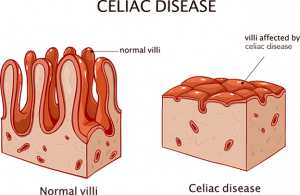
Celiac disease is an autoimmune disorder triggered by consuming gluten. While it primarily affects the small intestine, it can cause problems throughout the entire body. It is estimated to afflict approximately 1% of the world’s population, although it is more common in some places than in others. It is a lifelong condition with no known treatment except total avoidance of gluten.
What causes Celiac Disease?
The causes of celiac disease are not completely understood, but it is known to be hereditary and associated with certain genetic factors. Those with a first degree relative with celiac disease have a 1 in 10 chance of developing it themselves. Screening is advisable for people at high risk as symptoms can be subtle and extremely varied, and may not be obviously connected to digestive health.
Classic symptoms include pale, loose, greasy stool, and weight loss/failure to gain weight. These are caused by damage to the lining of the small intestine, which impairs the body’s ability to absorb nutrients from food. If an afflicted person continues to consume gluten, the damage will worsen and may become permanent. Celiac disease can also cause many other problems if left untreated, including early-onset osteoporosis, anemia, certain types of cancer, and heart disease. A more extensive list of symptoms is included below. Early detection may reduce the risk of health complications.
What is Gluten?
Gluten is a protein found in wheat and several other common grains including barley and rye. Many people with celiac disease are able to consume oats, but not all. Other grains such as corn and rice do not contain gluten at all and are safe to eat. Any food made with wheat flour, including most types of bread, will contain gluten.
Symptoms
There are more than 200 known symptoms of celiac disease, including:
- Diarrhea
- Fatigue
- Weight loss
- Bloating and gas
- Abdominal pain
- Nausea and vomiting
- Pale, foul-smelling, or fatty stool
- Constipation
- Anemia, usually from iron deficiency
- Loss of bone density (osteoporosis) or softening of bone (osteomalacia)
- Itchy, blistery skin rash (dermatitis herpetiformis)
- Mouth ulcers
- Headaches and fatigue
- Nervous system injury, including numbness and tingling in the feet and hands, possible problems with balance, and cognitive impairment
- Joint pain
- Reduced functioning of the spleen (hyposplenism)
- Depression or anxiety
- Seizures or migraines
- Missed menstrual periods
- Infertility or recurrent miscarriage
Beat Your Celiac Disease with Holistic Care
At Ann Arbor Holistic Health, our health experts have the tools to help diagnose your condition and the knowledge to help you manage and, sometimes, completely beat your health problems. Celiac’s disease does not have to be forever – autoimmune conditions can be overcome with changes in lifestyle, nutrition, movement, and more. They just need to be the right changes for you.
Maintaining a healthy life requires understanding, acceptance, and effort. Our goals are to determine the exact causes of your body’s suffering, and to create a customized care plan that addresses what your autoimmune system is lacking. Let’s remove what isn’t good for you, replace the bad with the good, and guide your system to repair and honor itself.
Contact Ann Arbor Holistic Health in Ann Arbor, Michigan, to schedule your appointment and find out how you can get help for Hashimoto’s disease and other autoimmune conditions.

